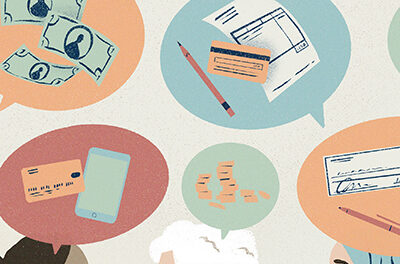Posted January 11, 2022 in Blue Springs, Insurance, Lifestyle, Banking Updates, Rushville, Overton, Merriman, Martin, Harrison, Cody, Clatonia, Chadron, Thedford, Crawford, Cozad, Hay Springs, Rapid City, Elwood, Valentine, Beatrice, Lincoln, Sidney
What to do with your Stimulus Check

The Coronavirus Aid, Relief, and Economic Security Act (CARES) provides needed assistance to businesses, expansions to unemployment insurance, and direct relief checks to many Americans.
If you qualify for a stimulus check, you may be wondering what to do with the money—or what the wisest thing to do might be. Here are a few things to consider.
Fill in Financial Gaps
Many Americans have found themselves struggling financially due to the Covid-19 pandemic. Those who have had their hours cut or have been laid off or furloughed have been particularly affected. For anyone caught by surprise or financially underprepared, the stimulus checks can provide a huge lift.
Before anything else, the money should be used to cover essentials for you and your dependents. The first thing to do is make housing payments, pay utility bills, buy groceries, and secure other necessities. Other things that may not be absolutely essential at the moment but are likely worth investing in include emergency kit items such as food with a long shelf life and medical supplies.
Supplement Your Emergency Fund
While it’s possible that more relief checks will be approved in the future, nothing is certain. It’s best to assume that this will be the only financial boost that you’ll receive and to plan accordingly. Strongly consider saving part or all of the money to extend or create an emergency fund. Ideally, you would have enough money available to support yourself and your dependents for at least 3-6 months, should you need it. If that’s not possible in your current situation, you can still give yourself a cushion to fall back on. It’s possible that the unemployment rate will continue to rise, so preparing for the worst is vital.
Pay Off Debt
If you have well-funded emergency savings, it’s a good idea to pay down, or better yet, pay off high-interest debt. Minimum payments and high interest rates can add stress to an already difficult financial situation. If you’re able to pay off that debt, you’ll save on payments throughout the coming months, giving you a long-term boost.
For some people, a one time check won’t be enough to truly make a difference with their payments. If you’ve found yourself unable to make debt payments due to the pandemic, consider reaching out to your lender. It’s likely that they’ll be willing to work with you. The last thing you want to do is hide from your payments and rack up additional late fees or penalties on top of your regular payments.
Boost the Economy
If you find yourself in a stable financial situation, meaning you have no consumer debt and well-funded emergency savings, the next best thing you can do with your stimulus check is to spend it— but spend it wisely. Economists have predicted that the effects of Covid-19 will send America into a large recession. These relief checks give everyday Americans the power to help mitigate the damages before the economy falls too far.
As you use your funds, consider supporting the areas that have been hit hardest such as small businesses, local restaurants, and other companies forced into temporary closures. Of course, donating to relief funds and legitimate charities is also a great way to use some of your stimulus check.
The amount that you choose to spend is up to you, though it’s wise to reserve at least part of your stimulus check to add to an emergency fund—even a robust one—should your financial situation unexpectedly change.
Some stimulus checks have already been deposited and others will continue to come in the following weeks. Carefully consider where that money will have the biggest impact and how you can most effectively utilize the funds before spending them.